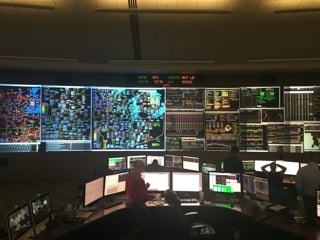Like any other commodity, electricity is bought and sold through wholesale and retail energy markets. The two main types of markets are wholesale and retail. Energy is initially sold on a wholesale market to utilities and other entities, who then resell it on the retail market to end-users. MISO facilitates one of the world's largest wholesale electricity markets. Competitive markets ensure prices remain as low as possible under all conditions. Hundreds of companies participate in one or more of MISO's four energy markets to buy and sell billions of dollars worth of electricity each year.
Real-Time Market: The Real-Time Energy Market balances energy supply with demand every five minutes at the least possible cost while maintaining reliable system conditions; including reserve requirements, congestion management and accurate price signals.
Day Ahead Market: The Day-Ahead Market serves as a "planning phase" for the next operating day. The outcome is an optimal set of unit commitment and hourly operating schedules for the following day. The Day-Ahead Market also calculates costs and allows buyers and sellers to lock in pricing prior to real time. This helps ensure that adequate resources are scheduled to meet the next day's anticipated demand.
Capacity Market: Think of a shopping mall parking lot. Most mall parking lots are sized with enough spaces to handle customer levels during peak shopping periods like around the Christmas holiday. On most days during the rest of the year, however, the lot is only partially full. MISO, working with state regulators and electricity users and providers, takes a similar approach to ensuring there are enough resources in place to keep the lights on during peak periods. The resources may not always be used, but are committed to MISO in case they are needed to serve customers ensuring reliable service even at peak times.
Financial Transmission Rights (FTR) and Auction Revenue Rights (ARR) Market: FTRs are financial instruments used to provide a financial hedge to manage the risk of transmission congestion cost in the Day-Ahead Energy and Operating Reserve Market. MISO facilitates annual and monthly FTR auctions. An Auction Revenue Right is a Market Participant’s entitlement to a share of revenue generated in annual FTR auctions.

Locational Marginal Pricing (LMP) is a market-based pricing mechanism used in electricity markets to determine the cost of electricity at a specific location on the power grid. It reflects the cost of supplying electricity at a particular point, taking into account the cost of generation, transmission losses, and congestion on the power grid. LMP is used to allocate the costs of electricity generation, transmission and distribution to different locations and to serve as the basis for settling energy transactions. Changing every five minutes or less, LMP reflects changes in supply and demand on the power grid.